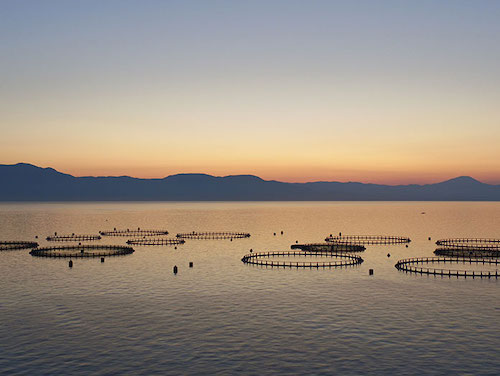(Photo: internet)
It’s not that I want to scare anybody out of the blue water, but swimming in the sea means swimming amidst the pee and poop of the fishes. No panic. The sea is big enough that you normally don’t notice any of this shit: except when you swim close to a fish farm where the fish are jammed in like sardines in a tin. They produce lots more pollution than free range fishes.
It is good that no Greek has had the idea of starting an octopus farm, like in Spain. After watching the Oscar winning Netflix documentary My octopus teacher by James Reed (which highlighted the intelligence of these eight legged sea creatures) lots of people stopped eating octopus and are now very opposed to these sea farms.
However, Greece has the largest number of (sea) fish farms in Europe, growing mostly sea bass (lavraki) and sea brase (tsipouro). They are fattened up and if they catch a cold or another virus they get antibiotics. They are stressed because of overcrowded cages and die mostly by choking to death or in a horrific slowly way in ice slurry.
Aqua culture is by no means a clean business, shown by the different researches that appear more and more in the media*. You’d better not have any of those fish pounds in your back yard: they pollute the sea, destroy the sea bottom and kill the balance of fish in specific areas.
In 2017 in Greece there were about 320 fish farms, mostly of average size and family businesses. The big money however smelled the farm fishes and now 70% of the Greek fish farms belong to Avramar, an international business that since 2016 is lead by investors who want to see money as quickly as possible. This business is bringing headaches to the inhabitants of the small island of Poros, wanting to expand many times the local existing fish farms. The locals are very angry because, for a great part, they live off eco tourism and the fish farms bring more troubles than advantages.
Lesvos has three fish farms: one south of Mytilini, one at the shielded Bay of Yera close to Skala Loutron and another one in the north west, at Agia Marina under Skalochori. Lesvos also is on the map of Avramar and I guess it is them, the private business who wants to expand, at least six times over, the already existing fish farm at Agia Marina.
Fishermen and other villagers of Skalochori say that this business has already caused enough harm and have united under the name ‘Fight against Fish Farms of Skalochori’. In an urgent letter to local and nationwide authorities they describe the troubles: fish farms attract lots of dolphins who are destroying the fishing nets; the pollution caused by shit, food and medicines has reduced the number of free fish in the once so rich fishing grounds and the sea bottom has been destroyed by pollution and frequent anchoring. Also the location of the farm has forced fishermen further out to sea, creating dangerous situations when the south winds are blowing. In contrast to other countries Greeks prefer to place their fish farms close to the shore, making for easier maintenance, but not making the fish any tastier because of the poor flow of the sea water so close to shore.
On Paros, Rhodes and Naxos a Beach Towel Revolution has taken place. The local population has revolted against the sun bed terror of making beaches more and more inaccessible for people who do not mind spreading their beach towels on the sand or who simply cannot afford to pay for a sun bed (on Paros you can pay 120 euros for a sunbed first row at the sea!). Their actions were so successful that the government has now initiated serious controls and plenty of illegal businesses have been fined, closed or even removed, as has happened on Mykonos.
Lesvos too should climb the barricades to fight for a clean sea, especially for the popular beaches of Tsichandra, Abelia, Anaxos and Petra. For example with a protest march along all those sunbeds. Tourists should know where its fish comes from and in what fish water they swim.
The Hellenic Aquaculture Producers Organization (H.A.P.O.) might not agree with all the pollution. They work on labeling the fish farmed in Greece as “Greek fish”. Imagine: by accident a Turkish fish might end up on your plate, being raised with kebab instead of souvlaki! I never encountered a fish with a flag “Greek fish”, but if I were a restaurant owner, I would quickly take away that label. Nowadays neither fish or investors are to be trusted.
*Consulted articles from amongst others: Euronews, The Ferret, Eurogroup for Animals, The Guardian.











